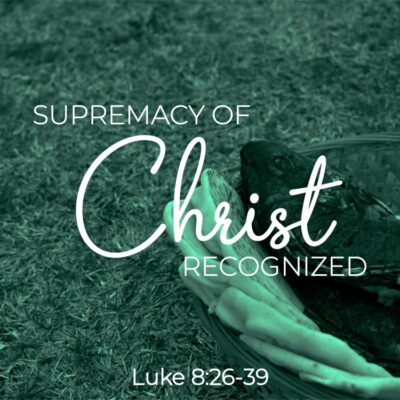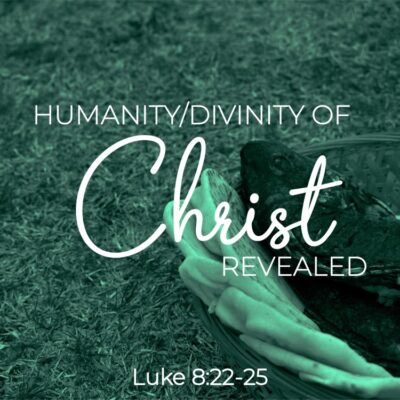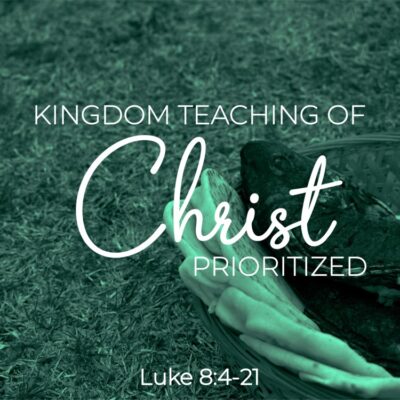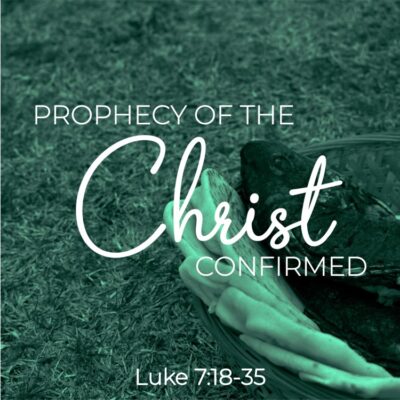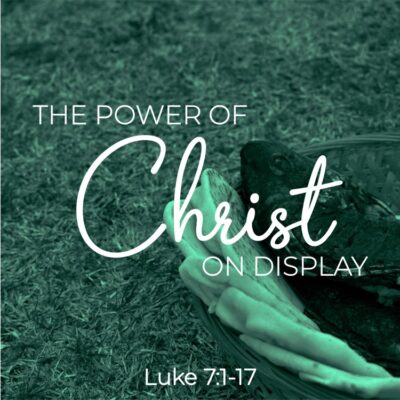Sermons on Luke (Page 2)
There is a passage toward the end of the Gospel of Luke that I believe gives us great insight into the character and disposition of our Lord Jesus. It is a passage that always challenges me. It challenges the motivation of my heart and it challenges the way I look at people and situations on a daily basis. The passage in Luke 19 gives us a glimpse into the love that Jesus had for His people. Luke 19:41-42 says, “And when he drew near and saw the city, he wept over it, saying, “Would that you, even you, had known on this day the things that make for peace! But now they are hidden from your eyes.” This people that had rejected Him and His teaching… this people who would one day soon unjustly punish Him with death on a cross… this people caused Him to weep as He considered their eternal destiny. Paul summed it up beautifully in his letter to the Romans when he said, “God demonstrates His own love toward us, in that while we were yet sinners, Christ died for us” (NASB). In spite of their hatred of Him, Jesus loved them! That love is continually demonstrated throughout these gospel accounts of His life and ministry. We see it in the events that we’ll be considering today in Luke 8.
When we are thinking about God—the Father, Son or Holy Spirit—and the spiritual conflict that rages in the spiritual dimension beyond our five senses, we must not think of Him as a superhero trying to defeat a supervillain whose power rivals or maybe exceeds His own. He is God Almighty! There is nothing and no one whose power and authority rivals that of Jehovah God. We see this to be true in the next passage we will be studying today in Luke 8. This is the second section of a group of miracles that Jesus performs in this chapter. Last week, we studied the text where Jesus calmed the winds and the waves while in a boat crossing the Sea of Galilee. The next three miracles (Luke 8:26-56) include the casting out of demons, the healing of the sick and raising the dead back to life—each one representing “a different sphere of activity (nature to demons to disease to death).”
In this portion of our series through the Gospel of Luke, we are focusing on “The Person and Power of Christ.” Jesus has demonstrated His power through miraculous signs and wanders (Luke 7:21-22), but nothing so far (not even raising the dead) compared to the power and authority He demonstrated to His apostles there on the Sea of Galilee. When we consider His power and dominion over all creation, why do we struggle to trust Him with the details of our lives? Sometimes, it is God’s will for us to experience the storms that life throws our way, but at other times, God chooses to calm the storm on our behalf—just to show us that He is in control!
This portion of Scripture has three teaching sections and an encounter with Jesus’ family. The primary teaching is commonly referred to as the Parable of the Sower, but I prefer The Parable of the Soils. Jesus taught this parable to the crowd that was following Him from town to town. Later, His disciples asked Him to further explain the meaning of this parable. Jesus explained it citing that the disciples had “been given to know the secrets of the kingdom of God.” After these two teaching sections, Jesus shared an additional parable highlighting the need to share the truths that they learned with others. The last part of our passage recounts how Jesus’ mother and half-brothers came to see Him, but Jesus did not stop His teaching to see them. This demonstrated how that Jesus’ priority was first and foremost His teaching ministry. According to other gospel accounts (cf. Mark 3:21; John 7:5), Jesus’ siblings—the children of Mary and Joseph—never supported Jesus’ ministry before His death and resurrection.
As followers of Christ, we are often referred to as “People of Faith.” How do we know that the faith we say we have is genuine? Faith is insufficient if it is faith in the wrong thing. Someone can be truly sincere in their faith and yet still be sincerely wrong. So again, how do we know that our faith is genuine? In our text today, we will first see a demonstration of genuine faith in Christ and then we will take a few minutes to consider some of the implications of this event in regard to our personal lives and the ministry-life of this church. It is important for us to embrace the truths taught here in these verses so that we will know how to communicate to the lost and dying world that there is good news—Jesus provides a way of salvation if you will only repent and believe!
Many of Jesus’ followers were first disciples of John the Baptist. John played a unique role in the pronouncement of the coming Messiah—the Christ. John had been preaching that the kingdom of heaven was coming soon, but even he did not fully understand what that would look like. Having been thrown into prison by Herod the tetrarch (Luke 3:19-20), John was unable to go to Jesus himself. When he heard all that was happening through the ministry of Jesus, John sent some of his disciples to Jesus to confirm that He was truly the promised Messiah. We should remember that John was the one who proclaimed, “Behold, the Lamb of God, who takes away the sin of the world!” when he saw Jesus approaching him to be baptized in the Jordan River (John 1:29). But just like any other sinful man, John was having some doubts about this because Jesus’ ministry was not what he (or anybody else) expected. John the Baptist needed confirmation from Jesus to help alleviate any doubts he might have about the ministry of the Messiah.
Jesus, having just given His ministry manifesto in Luke 6 in the Sermon on the Plain, is now demonstrating His love and power to those who were beginning to follow Him. In this passage, there are two miraculous healings that take place—first was the servant of a Roman centurion and second was the only son of a widow. In each instance, Jesus demonstrated His authority thereby confirming His authority to teach as He did in Luke 6, but the motivation to perform these miracles seems to be two-fold—the first miracle happened because of the faith of the centurion and the second because of Jesus’ compassion for the plight of the widow. We learn a lot here about Jesus’ character in this passage.
As we take a few minutes this morning to consider the sacrificial death of Jesus upon the cross, I want us to consider how each group/individual responded to Jesus in that moment—on that day when He was crucified. I think we might be surprised to see how things really haven’t changed—almost two-thousand years have come and gone and people are still responding to Jesus in the same way! We’ll be considering most all the characters that are part of the crucifixion narrative in the gospels of Luke and John this morning. There are a bunch of them, but we’ll do our best to identify them, see their part in the chain of events and then note how they responded to Jesus (and how that correlates with the way people today respond to Him too).
While waiting for her wedding day, an angel appeared to Mary to explain what was about to happen to her. When the angel spoke to her, he said, “Greetings, O favored one, the Lord is with you.” Mary was a recipient His grace. God pursued her with His grace! So today, we’re going to focus in on the interaction Mary had with the angel, Gabriel, and with her cousin, Elizabeth, from Luke 1. We will look specifically at Mary’s character and the struggles that she experienced—social, mental and emotional struggles—as she carried the Promised Messiah.
Before the world began… before mankind was created… before we ever chose to disobey God in sin… God had a plan to reconcile mankind to Himself. He knew that we would sin, and so, He provided a way to be made right in His presence. That way was, is, and always will be Jesus Christ. That was God’s Plan A and there was no Plan B! So, throughout the recorded history of the Bible, God chose to use people who were willing to yield their lives to Him to pronounce the truth of His Word concerning the coming Messiah—the One who would deliver His chosen people once and for all!

